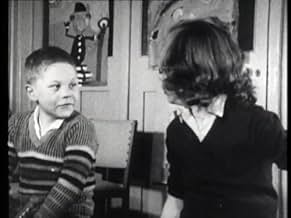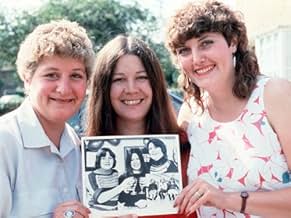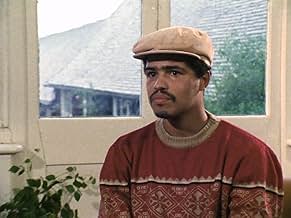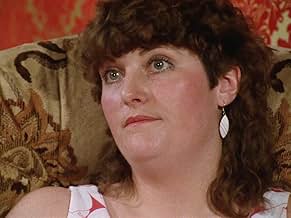28 Up
- Película de TV
- 1984
- 2h 16min
PUNTUACIÓN EN IMDb
8,1/10
3,2 mil
TU PUNTUACIÓN
Añade un argumento en tu idiomaThis eye-opening episode uncovers human nature and the desire to survive and succeed in all its heart-breaking glory.This eye-opening episode uncovers human nature and the desire to survive and succeed in all its heart-breaking glory.This eye-opening episode uncovers human nature and the desire to survive and succeed in all its heart-breaking glory.
- Ganó 1 premio BAFTA
- 3 premios y 3 nominaciones en total
Bruce Balden
- Self
- (as Bruce)
Jacqueline Bassett
- Self
- (as Jackie)
Symon Basterfield
- Self
- (as Simon)
Andrew Brackfield
- Self
- (as Andrew)
John Brisby
- Self
- (metraje de archivo)
- (as John)
Peter Davies
- Self
- (as Peter)
Suzanne Dewey
- Self
- (as Suzi)
Charles Furneaux
- Self
- (metraje de archivo)
- (as Charles)
Nicholas Hitchon
- Self
- (as Nick)
Neil Hughes
- Self
- (as Neil)
Lynn Johnson
- Self
- (as Lynn)
Paul Kligerman
- Self
- (as Paul)
Susan Sullivan
- Self
- (as Sue)
Tony Walker
- Self
- (as Tony)
Michael Apted
- Interviewer
- (voz)
- (sin acreditar)
Michelle Murphy
- Self (age 7, with Tony)
- (metraje de archivo)
- (sin acreditar)
Reseñas destacadas
I got hooked on these. The first one was only mildly interesting, a sort of necessary toll. Everything of interest in it is repeated later, but it was a solid reference for the editions that followed. The next two editions were absolutely captivating.
There's something about that period before you become an adult, a time when switches could flip, butterflies can affect. The conceit of the series is that the British class system is deterministic. So the game in the first films is in engaging with these people in support. We send wishes into the ether, attempting to reach across space and time. The don't grow up until we see them and when they are restricted, it is because of constraints we allow.
Any failure at this stage, any flaw in character is in part our responsibility. So we experience a blizzard of minor successes and defeats. Each person is a collector of urges, each a measure of a successful or failed society. These two (14 up and 21 up) were engaging films.
But by now, these are genuine adults. What errors in formation that could be influenced by our surrogate parenting have already set. Now they are simply beings. The only mildly engaging of these souls is Neil, a bum on the dole. Everyone else is no more now than someone ordinary that you encounter in life, each on their own path, working on narrow futures beyond our control.
The major difference is that some have some things to claim over the others. Different things, but each presented in comparison.
I wonder if I can stand the investment of what comes next.
Following this, you are following Apted as he grows in skill, insight. What he looks for as signs of maturity. I hope he is up to the task. His other films seem to imply that he is one of the failures, that our urges, wishes, prayers didn't reach him.
Ted's Evaluation -- 2 of 3: Has some interesting elements.
There's something about that period before you become an adult, a time when switches could flip, butterflies can affect. The conceit of the series is that the British class system is deterministic. So the game in the first films is in engaging with these people in support. We send wishes into the ether, attempting to reach across space and time. The don't grow up until we see them and when they are restricted, it is because of constraints we allow.
Any failure at this stage, any flaw in character is in part our responsibility. So we experience a blizzard of minor successes and defeats. Each person is a collector of urges, each a measure of a successful or failed society. These two (14 up and 21 up) were engaging films.
But by now, these are genuine adults. What errors in formation that could be influenced by our surrogate parenting have already set. Now they are simply beings. The only mildly engaging of these souls is Neil, a bum on the dole. Everyone else is no more now than someone ordinary that you encounter in life, each on their own path, working on narrow futures beyond our control.
The major difference is that some have some things to claim over the others. Different things, but each presented in comparison.
I wonder if I can stand the investment of what comes next.
Following this, you are following Apted as he grows in skill, insight. What he looks for as signs of maturity. I hope he is up to the task. His other films seem to imply that he is one of the failures, that our urges, wishes, prayers didn't reach him.
Ted's Evaluation -- 2 of 3: Has some interesting elements.
"Give me the child until he is seven, and I will give you the man." So goes the old proverb, and the proof is in this fascinating documentary, the fourth chapter in an ambitious, ongoing epic of non-fiction filmmaking already two decades in the making at the time.
The project began in the middle 1960s as a modest examination of English class divisions in a group of seven-year old children from different social backgrounds, and has been updated every seven years to show their progress through adolescence to young adulthood. Each individual biography resists the pre-determined notions of (specifically English) status and privilege around which the entire cycle of films is based, becoming instead a record of the same, sometimes rocky path to maturity followed by everyone, regardless of upbringing. At age seven every child is carefree and impressionable; at fourteen most are sullen and inhibited, uncomfortable in puberty; at twenty-one they are, by degrees, poised to reach their potential: eager and naive or cynical and confused.
And by age 28 their niche in society has been secured, for better or (sadly) for worse. The candid self-analysis, and the range of insight and opinion, makes the film (individually, and as a series) an invaluable document of human growth and development, as well as an irresistible reminder of our own personal destiny.
The project began in the middle 1960s as a modest examination of English class divisions in a group of seven-year old children from different social backgrounds, and has been updated every seven years to show their progress through adolescence to young adulthood. Each individual biography resists the pre-determined notions of (specifically English) status and privilege around which the entire cycle of films is based, becoming instead a record of the same, sometimes rocky path to maturity followed by everyone, regardless of upbringing. At age seven every child is carefree and impressionable; at fourteen most are sullen and inhibited, uncomfortable in puberty; at twenty-one they are, by degrees, poised to reach their potential: eager and naive or cynical and confused.
And by age 28 their niche in society has been secured, for better or (sadly) for worse. The candid self-analysis, and the range of insight and opinion, makes the film (individually, and as a series) an invaluable document of human growth and development, as well as an irresistible reminder of our own personal destiny.
Filmmaker Michael Apted's pet project for British television (released theatrically in several countries) is an occasionally fascinating, sometimes boring documentary which spans many years as Apted interviews a handful of British schoolchildren in the 1950s, catching up with them seven years later and so on until the kids have reached the age of 25. For the sake of cinema, it is a shame that the subjects whom Apted initially chose for his portrait turned out to be such colorless personalities. There are a few tragedies which unfold with the heartrending beauty of fictional melodrama, yet this installment runs out of intriguing moments long before it is over. Apted is to be commended, nevertheless, for a brilliant cinematic idea. Followed in due time by "35 Up", "42 Up", "49 Up". **1/2 from ****
The 'Up Series' represents one of the most fascinating and unusual uses of film in cinema history - a documentary life-long chronicle of the lives of 14 people starting at 7 years old, revisiting them every seven years through age 49 (so far).
While I could quibble, wishing for a bit more depth here and there (especially with the women, where there's a bit too much emphasis on love and marriage at the expense of all else), it's really an astounding, moving, frightening and uplifting document. There's no way to watch this remarkable series of films without reflecting deeply on one's own life, and how you have changed (and stayed the same) over your own lifetime.
While Michael Aped deserves every bit of credit he's received for this amazing piece of cultural anthropology, it's important to note this first film, 7 Up,was actually directed by Paul Almond, and Apted was a that point a researcher for the project.
While I could quibble, wishing for a bit more depth here and there (especially with the women, where there's a bit too much emphasis on love and marriage at the expense of all else), it's really an astounding, moving, frightening and uplifting document. There's no way to watch this remarkable series of films without reflecting deeply on one's own life, and how you have changed (and stayed the same) over your own lifetime.
While Michael Aped deserves every bit of credit he's received for this amazing piece of cultural anthropology, it's important to note this first film, 7 Up,was actually directed by Paul Almond, and Apted was a that point a researcher for the project.
"Give me a child until he is seven, and I will give you the man," goes a Jesuit proverb, which the "Up" documentaries quote. Every seven years, Michael Apted interviews the same Britons to see how they have changed. "28 Up" is the fourth installment of the series--the interviewees are now each 28 years old. The children are now the men, or women. It's not necessary to have seen, or recall, the previous installments of the television series to watch this episode, because the filmmakers intercalate clips from previous episodes with the new scenes. Via film editors Kim Horton and Oral Norrie Ottey, "28 Up" stands well by itself. We're timely shown how the interviewees have changed.
The proverb seems oft to hold true, but there are some surprises. Suzi, for example, was "very cynical" about marriage as a 21-year-old chain-smoker, but at 28 years old is a cheerful wife. Tony, however, said he wanted to be a cabby if he didn't succeed as a jockey--now he is a cabby, and he seems happy.
Besides examining their individual lives, the series also examines the differences among socioeconomic classes in Britain. John, although he didn't participate in the show at 28 years old, made two interesting comments on class issues in previous episodes (viewed again here). He said it "doesn't mean because you sweep the streets you're any less valuable than someone who's running a huge corporation. Not everyone can be at the top. As long as people are happy at what they're doing." John is from the upper classes and attended a private school. He went onto say, "And this is what worries me about these new sort of invidious sort of class attitudes that certain subversive elements are introducing...."
Class issues don't seem to bother most of the cast; most of them seem content with their role in society, as John advocated as the "greatest good that could be." Yet, John is also a bit of a snob. Contrastingly, Bruce is a socialist from the upper classes, and he is now teaching math in a public school.
Women's role in family and society is another issue examined in the film. Jackie, Nick's wife, discussed how she and her husband might balance work with children. Jackie (a different one), Lynn and Sue are the program's three working-class women. They're all married now, and they characterized marriage as a partnership of equals. Jackie has decided not to have children, at least not yet.
Inevitably, some of the interviewees are more interesting than others are. For example, Symon (who had the misfortune of being the last interviewed) was a bit boring. At 21 years old, he was working in a freezer room; he said, "I couldn't stay there for that long--my mind would go dead." He's still working there at 28 years old. It wasn't apparent to me that his mind had died, but perhaps the job has caused him to appear dull in this segment.
Finally, Neil, lanky, serious-minded and depressed, is to me (and many other viewers) the most interesting person of the gang. Neil is now a tramp traveling around Britain. The most memorable sequence of the film is of Neil nodding nervously as he sits by a waterfront, discussing his life and past, hesitating often as he thinks about how to better articulate his thoughts, or to reflect on his thoughts before he is posed another question.
The proverb seems oft to hold true, but there are some surprises. Suzi, for example, was "very cynical" about marriage as a 21-year-old chain-smoker, but at 28 years old is a cheerful wife. Tony, however, said he wanted to be a cabby if he didn't succeed as a jockey--now he is a cabby, and he seems happy.
Besides examining their individual lives, the series also examines the differences among socioeconomic classes in Britain. John, although he didn't participate in the show at 28 years old, made two interesting comments on class issues in previous episodes (viewed again here). He said it "doesn't mean because you sweep the streets you're any less valuable than someone who's running a huge corporation. Not everyone can be at the top. As long as people are happy at what they're doing." John is from the upper classes and attended a private school. He went onto say, "And this is what worries me about these new sort of invidious sort of class attitudes that certain subversive elements are introducing...."
Class issues don't seem to bother most of the cast; most of them seem content with their role in society, as John advocated as the "greatest good that could be." Yet, John is also a bit of a snob. Contrastingly, Bruce is a socialist from the upper classes, and he is now teaching math in a public school.
Women's role in family and society is another issue examined in the film. Jackie, Nick's wife, discussed how she and her husband might balance work with children. Jackie (a different one), Lynn and Sue are the program's three working-class women. They're all married now, and they characterized marriage as a partnership of equals. Jackie has decided not to have children, at least not yet.
Inevitably, some of the interviewees are more interesting than others are. For example, Symon (who had the misfortune of being the last interviewed) was a bit boring. At 21 years old, he was working in a freezer room; he said, "I couldn't stay there for that long--my mind would go dead." He's still working there at 28 years old. It wasn't apparent to me that his mind had died, but perhaps the job has caused him to appear dull in this segment.
Finally, Neil, lanky, serious-minded and depressed, is to me (and many other viewers) the most interesting person of the gang. Neil is now a tramp traveling around Britain. The most memorable sequence of the film is of Neil nodding nervously as he sits by a waterfront, discussing his life and past, hesitating often as he thinks about how to better articulate his thoughts, or to reflect on his thoughts before he is posed another question.
¿Sabías que...?
- CuriosidadesPeter Davies lost his job as a teacher because of the anti-Thatcher comments he made in this film.
- Citas
Neil Hughes: If the state didn't give us any money, it would probably just mean crime and I'm glad I don't have to steal to keep myself alive. If the money runs out then for a few days there's nowhere to go and that's all you can do, I simply have to find the warmest shed I can find.
- ConexionesFeatured in 35 Up (1991)
Selecciones populares
Inicia sesión para calificar y añadir a tu lista para recibir recomendaciones personalizadas
Detalles
- Duración2 horas 16 minutos
- Color
- Mezcla de sonido
- Relación de aspecto
- 1.33 : 1
Contribuir a esta página
Sugerir un cambio o añadir el contenido que falta























